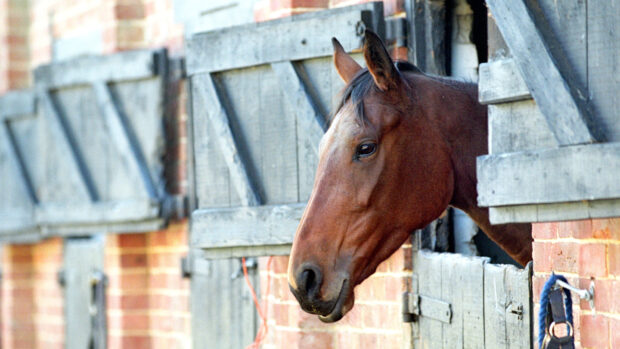Q: I have a 16-year-old 15hh Arab mare on loan. When she first came to me two years ago, she was a crib biter, but with plenty of turnout she seemed to stop.
Lately, however, she has started the habit again. She seems to be even worse than before and I am worried it may cause health problems. What can I try to get her out of this habit?
Liz Clemence replies: It is unclear why some horses are more prone to stable vices than others and, while it is possible to discourage crib biting, a total cure is rare and the horse will often start again when he feels stressed.
Many horses crib bite all their lives with few ill effects but it can cause digestive problems and, in some cases, weight loss or colic.
The incisor teeth sometimes wear unnaturally thin, and, in extreme cases, they may no longer meet correctly when the horse’s mouth is closed, making grazing difficult.
However, by establishing a good daily routine for your mare and with clever use of some of the following deterrents, you should be able to discourage her from crib biting.
Top tips to reduce cribbing
- Boredom or stress are often thought to be major factors in stable vices. If possible, turn your horse out by day to allow her the freedomto graze and play.
- Running a line of electric fencing along the top of your post and rail fencing or sectioning off an area of field with portable electric fencing will prevent her from having anything to grasp hold of in order to be able to crib bite.
- Avoid the possibility of vices being copied by keeping wind suckers and crib biters out of direct sight of other horses on the yard.
- You could put up a metal grid to prevent the horsecrib biting on the stable door. This does, however, have the negative effect of preventing the horse looking out over the stable door and increasing boredom.
- Consider trying your mare in a wind suck or crib bite collar. The collar works by causing discomfort when the horse attempts to arch his neck in order to suck in and swallow air, which helps prevent the vice.
- Remove any edges in the stable which your horse grabs when crib biting.
- Paint any areas which cannot be removed with a specially-made preparation that discourages crib biting. They can be easily obtained from most equestrian outlets.
- Relieve stable boredom by introducing toys to occupy your horse. Try smearing them with treacle or molasses, or attaching a favourite treats to add interest.
- If possible, split your horse’s daily hay ration into smaller but more frequent haynets, to keep her busy.
- Make sure your horse is exercised regularly and sufficiently. Make her work interesting and varied.Read more about stable vices:



